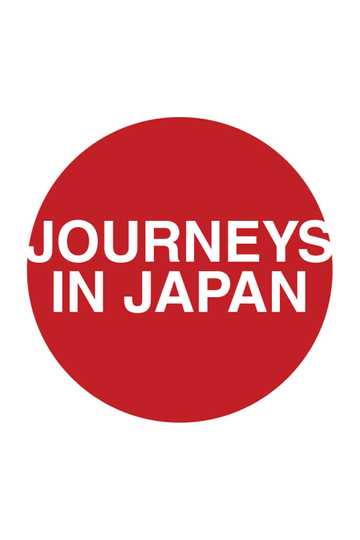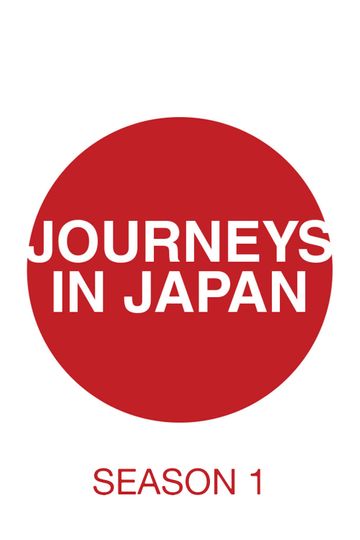Season 11 Episodes
1. Asago: Hidden Gem of Heritage and History
Asago lies deep in the mountains of Hyogo Prefecture in western Japan. In recent years it has been drawing crowds of visitors, who come to view its famous "Castle in the Sky," which appears to float above a sea of clouds. The Asago area also has a proud heritage as a major center for mining, and it boasts impressive relics from the time when it played a key role in Japan's modernization. Oscar Brekell is a specialist and instructor of Japanese tea, who comes from Sweden. On this episode of Journeys in Japan, he visits Asago to witness the spectacular natural scenery. He also explores the industrial heritage sites and meets the local people who are working to keep their community vibrant.
2. Suo-Oshima: Finding Hawaii in the Inland Sea
The island of Suo-Oshima lies off the coast of southeast Yamaguchi Prefecture, in western Japan. It's one of the prefecture's main areas for growing mandarin oranges. Since the 19th century, the island has had close ties with the US State of Hawaii. On this episode of Journeys in Japan, TV personality Kanoa, who was born in Hawaii, visits Suo-Oshima to explore its rich natural environment and to find out more about its connection with her homeland.
3. Unlocking the Mysteries of Ancient Asuka
Asuka in Nara Prefecture was the center of Japan's politics and culture for more than 100 years from the end of the 6th century. The advanced civilization that developed there left behind many legacies, especially its mysterious stone structures. The massive monuments have spawned countless theories. Actor Luke Bridgford explores these imposing stone structures, as well as their enduring puzzle, and visits other historic sites.
4. Yokohama: A Port Town with It All
Yokohama, just south of Tokyo, is a vibrant port city steeped in history. When Japan first opened its first doors to the West in the mid-19th century, they opened in Yokohama. Soon after, a foreign settlement was established, serving as a window to Western culture. Photographer Alfie Goodrich focuses his lens on the cosmopolitan port city, discovering its beauty and multicultural heritage.
5. Mishima, Fukushima: Keeping Alive the Folk Craft Tradition
Mishima Town, in western Fukushima Prefecture, receives some of the heaviest snowfall in all of Japan. During the winter, when the local people are unable to work in their fields, they spend their days making traditional handicrafts, using vines, leaves and bark from plants that grow wild on the nearby mountainsides. It's a folk tradition that continues to this day. Leina Bambino is an English instructor from the United States. On this episode of Journeys in Japan, she visits Mishima to meet the people living there, and sees how they keep their traditions alive. She also joins in a New Year ceremony that's been held in this area for over 200 years.
6. Tsugaru: Deep Snow, Warm Hearts
The Tsugaru region lies in the west of Aomori Prefecture, far in the north of Japan's main island. It is famous for having some of the heaviest snowfalls in the whole country. The local people are proud of their distinctive traditional culture and food products, which have been passed down to the present day. On this episode of Journeys in Japan, our traveler is Kanoa, a model who grew up in the warm climate of Hawaii and southern California. She visits Tsugaru in the depth of winter, and discovers the warmth that comes from the community spirit linking the people who live in this region.
7. The Magic of Winter in Akita
Akita Prefecture, in northern Japan, celebrates its snowy season with many unique festivals. American illustrator Kailene experiences 3 of Akita's winter festivals and discovers the area's deep traditions.
8. Hateruma: Life on a Distant Island
Located 2,000 kilometers southwest of Tokyo, Hateruma is the southernmost inhabited island in Japan. With a population of about 500, it's known for its beautiful beaches and the local specialty, brown sugar. About 70% of the island's flat land is covered by sugarcane fields. When the cane is harvested in winter, the farmers work in teams, along with seasonal laborers from outside. Since the old days, the islanders have fostered this traditional spirit of cooperation. On this episode of Journeys in Japan, British photographer Alfie Goodrich meets the people of Hateruma, to see how they live on this distant subtropical island.
9. Hakkoda's Backcountry Magic
The Hakkoda mountain range soars in central Aomori Prefecture. It's famous for its heavy snowfall, massive "snow monster" or frost-covered trees and its backcountry skiing. These days more overseas visitors are coming to enjoy the deep powder and local culture. International mountain guide Cveto Podlogar from Slovenia drops down the stunning slopes of Hakkoda with a local guide.
10. Asahikawa: Adventures on Sleds and Wheels
Located in the center of Hokkaido Prefecture, Asahikawa City is Hokkaido's second largest city. It is also one of the coldest places in all of Japan, with winter temperatures often dropping to minus 20 degrees Celsius. In February, the city's annual 6-day winter festival draws close to a million visitors. On this episode of Journeys in Japan, Dean Newcombe and Nakaoka Aki explore Asahikawa in midwinter, and find that it has numerous attractions that are equally accessible to those who use wheelchairs.
11. Rivers of Life: Kaizu and Kuwana
Located in central Japan, Kaizu City in Gifu Prefecture and Kuwana City in Mie Prefecture are just downstream of the Kiso Three Rivers -- the Kiso, Nagara and Ibi. They caused major flooding in the past, but also provided people with sustenance. Rakugo performer Cyril Coppini from France explores the area and discovers how people have long coexisted with these water forces.
12. Ishigaki: A Look to the Future
Ishigaki, in Okinawa Prefecture, is a stunning, sub-tropical island that lies some 2,000 kilometers southwest of Tokyo. This past spring, the mayor introduced a policy to drastically reduce the number of visitors from outside to stem the spread of the coronavirus. Though the restriction was lifted it has dealt a heavy blow to tourism, the island's main industry. Eric van Rijn, who lives on Ishigaki and works in tourism, visits fellow islanders as they try to make a fresh start after the initial corona shock.
13. KAGAWA: Treasure House of Modernist Architecture
Kagawa Prefecture is the smallest of the 47 prefectures of Japan in area. It puts emphasis on the promotion of architecture and art as a main pillar of its regional development. The prefectural commitment began during the post-war era in the mid-1900's when the then governor devised an individual policy to rebuild the prefecture's capital city, Takamatsu. Takamatsu City had been reduced to ruins because of repeated air bombings during World War II. The governor launched a huge project of constructing a new building for the prefectural government office that would serve as a symbol of not only post-war reconstruction but also democracy. The spirit of the governor has lived on to date across the prefecture. On this episode of Journeys in Japan, we introduce several architectures that represent Kagawa, and explore the history and culture of the prefecture that has chosen to follow its own path.
14. Atami is Back
Atami is a resort popular for its dramatic coastline, hot springs and proximity to Tokyo. After a period of decline, it had been making a miraculous recovery until the pandemic. But the community swiftly worked together to introduce measures to face the crisis. And visitors have been going back. Actor Charles Glover, who visited Atami in 2018 for Journeys in Japan, does some armchair traveling to see how old and new friends are getting on.
15. Otoyo: Bringing Fresh Life to a Traditional Community
Otoyo Town in Kochi Prefecture is located in the center of the Shikoku Mountain Range. More than 80% of its land is covered with forest. This mountain community is the only place that produces a special variety of tea, called Goishi-cha. Goishi-cha is a traditional specialty of Otoyo, which has been passed down in the community for over 400 years. Otoyo also lies on the Yoshino River, which is one of the 3 rivers with the wildest, strongest currents in Japan -- and also the birthplace of rafting in the country. On this episode of Journeys in Japan, we meet the people of Otoya, who have kept alive their traditions over the centuries, as well as newcomers who have moved into the community, lured by the beauty of its natural environment.
16. Rural Reboot: Kamiyama's Renaissance
Kamiyama, Tokushima Prefecture, is a mountain village with a population of 5,000. But despite its tranquil setting, it's home to satellite offices of firms headquartered in Tokyo or Osaka Prefecture. An inflow of people from big cities is bringing changes to Kamiyama. We meet a group of new residents who are working to turn Fusuma Karakuri, which uses background panels for Japanese traditional performing art, puppet theater, into a new form of entertainment. We also visit an outdoor museum with modern artworks. In this episode of Journeys in Japan, Martin Holman, an American who heads a puppet troupe in Tokushima, explores old and new aspects of Kamiyama and zooms in on its charms.
17. Nanmoku: Afterglow of the Silk Road
Nanmoku is a village that lies deep in the mountains of Gunma Prefecture, northwest of Tokyo, which blossomed during the period of Japan's modernization over a century ago. It grew and prospered thanks to sericulture -- raising the silkworms whose cocoons were the source of raw silk, an essential cornerstone of Japan's efforts to bring in foreign currency and new technology. However, the development of synthetic fibers led to a drop in demand for raw silk, and this led to the decline of Nanmoku as well. Its population has dropped from over 10,000 some 60 years ago to only about 1,700 residents now. But thanks to its remote setting, the village has been spared large-scale development, and its traditional culture and buildings have been preserved much like a time capsule. On this episode of Journeys in Japan, Teodora Forgo from Hungary explores the beautiful natural setting and fascinating history of Nanmoku Village, deep in the mountains northwest of Tokyo.
18. Work-Life Bliss in Itoshima
Itoshima, in western Fukuoka Prefecture, has been drawing attention in recent years as a popular place to relocate to from major cities. The reasons? Easy access to the prefecture's biggest city, Fukuoka; stunning beaches and mountains, alongside a vibrant startup culture and art scene. On Journeys in Japan, Brandon Chin, an American who fell in love with Itoshima for its ideal work-life balance, shows us around his adopted town.
19. Ogawa Village: Laidback Living with Mountain Vistas
Ogawa Village in Nagano Prefecture is famous throughout Japan for its beautiful scenery. Even though it lies between 2 popular tourist spots, Nagano City and Hakuba, Ogawa is not overrun by visitors. With its majestic vistas of the Japanese Alps and laidback pace of life, it's the ideal destination for a quiet get-away.
20. Omi-hachiman: Historic Merchant Town on Sacred Lake
Omi-hachiman is an old castle town that flourished as a transportation hub on Lake Biwa. It retains the remnants of the olden days, including grand merchant homes and the Hachiman-bori moat, which served as a logistics base. William Merrell Vories, who came to Japan from the United States before World War II and designed 1,600 significant buildings across Japan, made Omi-hachiman his home for over half a century. His residence in Omi-hachiman has been converted into a museum. On this episode of Journeys in Japan, James Kohlman, a musician and actor from the United States, traces the footprints of Omi Merchants, who crisscrossed Japan from their base in Omi-hachiman, as well as the remarkable William Merrell Vories. And he meets people in whom their spirits live on.
21. South Iwate: On the Trail to Recovery
The Michinoku Coastal Trail runs along the Pacific coast of northeastern Japan, covering a distance of about 1,000 kilometers through 4 prefectures, from Aomori down to Fukushima. It was launched by Ministry of the Environment following the 2011 Great East Japan Earthquake. On this episode of Journeys in Japan, Canadian actor Kyle Card hikes from Ofunato to Rikuzen-takata in southern Iwate Prefecture. He enjoys the bracing landscape, meets the local people, and sees how communities along the way are rebounding from the devastating Great East Japan Earthquake and tsunami of 2011.
22. Passion on the Vine: Yamanashi and Its Winemakers
Yamanashi Prefecture has been a pioneer in winemaking in Japan since the mid-19th century when farmers began converting rice and mulberry fields into vineyards for the native Koshu grape. Nowadays, the crisp white wine has been winning awards at global wine events. On Journeys in Japan, we meet the passionate people behind the most talked about Koshu labels -- some coming from old winery families and others from unrelated industries.
23. Ashio: Memory of the Forest
Deep in the mountains of Tochigi Prefecture, 100 kilometers north of Tokyo, Ashio has long been known as a mining town. Copper deposits were first discovered there 400 years ago and mining continued there until the 1970's. In its heyday, the mine produced 40 percent of all of Japan's copper and nearly 40,000 people lived in the area. Although mining brought prosperity, it also created massive pollution: Ashio became infamous as the site of the country's first major pollution disaster. Sulfur dioxide gas from the refining process killed off the surrounding forests. And huge amounts of toxic chemicals were carried downstream to the lowlands by the Watarase River. On this episode of Journeys in Japan, potter Euan Craig travels to Ashio to see for himself how people have brought life back to the mountains, thanks to a massive reforestation program.
24. Miyagi: On the Trail to Recovery
The Michinoku Coastal Trail stretches more than 1,000 kilometers along the Pacific coast, crossing 4 prefectures from Aomori in the north, to Fukushima in the south. Canadian actor, Kyle Card hikes a length of untamed nature in Miyagi Prefecture, starting from the northern border with Iwate Prefecture to Kesennuma and Onagawa. He savors the rugged landscape and sees how locals are moving forward and recovering from the 2011 Great East Japan Earthquake.
25. Ojiya: Deep Roots in Snow Country
The city of Ojiya is hidden in the mountains of central Niigata Prefecture, some 200 kilometers north of Tokyo. Because this region gets some of the heaviest snowfall in all Japan, it is known as the Snow Country. Since the old days, people in Ojiya have used this location and climate to their advantage, developing a distinctive culture and traditions all their own. These include Nishiki-goi (ornamental carp) and Ojiya chijimi, a fabric that is recognized by UNESCO as an intangible cultural heritage. On this episode of Journeys in Japan, Paul Riley visits Ojiya in the autumn months, to discover its traditional specialties.
26. Revisiting Ibaraki's Autumn-Winter Flavors
Ibaraki Prefecture, which stretches along the Pacific Ocean, is known for its diverse nature. Along with the sea, expansive plains, forests and lakes have made Ibaraki a leading agricultural and fishery producer in Japan -- feeding its people, and Tokyo residents. On this trip, Japanese chef David Wells, originally from the United States, tastes his way through the area, enjoying the flavors of fall and winter. The highlights? Hitachi Aki Soba noodles in the prefecture's north, Hoshi-imo dried sweet potato on the coast, and Kan-shijimi clams in Lake Hinuma.




















